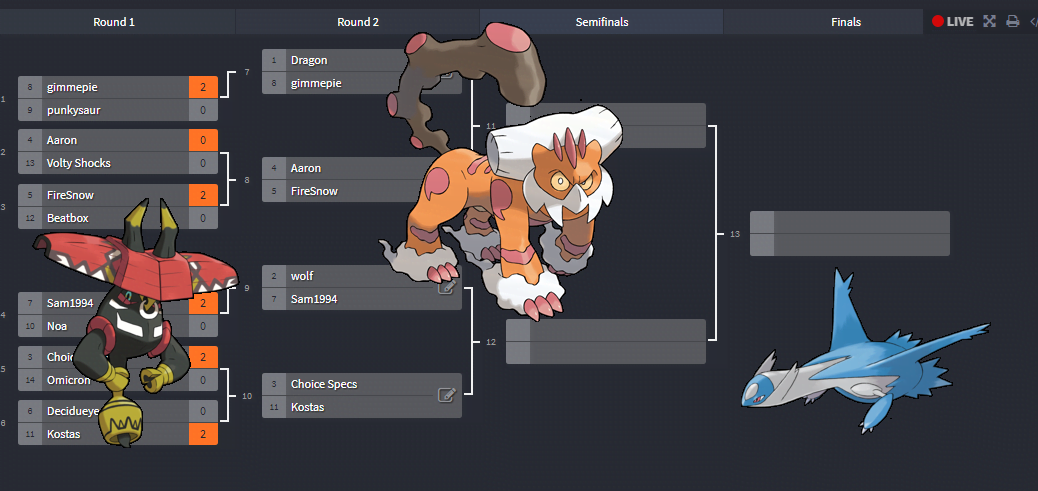PokéCommunity Tournament Guide
Interested in competing in tournaments on PokéCommunity but don’t know where to start? Worry not! This article will help you understand all of the basics about PokéCommunity’s tournaments!
Section 2 – Tips on How to Succeed in Tournaments
This section discusses some small tips on how to succeed in tournaments. These are in no way a guarantee for you to win, but rather extra steps that you can take to help you gain an upper hand before your match.
Scouting
All of the battle replays must be posted in the tournament thread. As a result, if you are playing versus someone who has already played in the tournament, you can check their replays to see what teams they were using. Some players keep the same team in between rounds, so it becomes easier to prepare for these opponents, unless they suddenly switch it up.
However, the most important thing to look at while scouting is to look at a player’s playstyle. How do they predict? Do they play like I expect them to? Then you can adapt your playstyle to “counter” their playstyle. For example, if you know nine-times-out-of-ten that your opponent will switch out to their counter, then you should use the correct move or double switch to capitalize on that knowledge. If you know your opponent will always hit what is in front of them, then go and make the correct switch to capitalize on that knowledge. But be cautious, as your opponent can adapt mid-battle, so think twice before making a risky play!
Teambuilding
A huge part of tournaments is teambuilding. This is because PokéCommunity tournaments usually come with some form of restriction on teambuilding. For example, Nah’s Fun In the Sun tournament has a restriction where participants have to have one Pokémon with the Ability Drought and another Pokémon with an Ability that worked in conjunction with Sun in some way (Chlorophyll, Leaf Guard, etc.).
When tournaments are posted, first try to narrow down which Pokémon are essential to the format. Note that this may be easier for some formats than for others. For example, Fun In the Sun requires a Drought user, so list off the Pokémon that can have the Ability Drought and make mental notes that they are required (though this has been done in the tournament thread).
Next, you want to look at which Pokémon will be strong in the format. Note that the specifics of this step may vary from tournament to tournament, since some tournaments have harder restrictions than others. Do some brainstorming and testing to see which Pokémon can perform the best given the restrictions. As an example again, in Fun In the Sun there may be two sets of Pokémon you want to consider: strong Sun-abusers (required Pokémon in this case) and Pokémon that have good synergy with Sun teams or can counter the required Pokémon (not required but are strong). Venusaur is a good example of the first, while Heatran is a good example of the second.
After you have the main set of strong/required Pokémon listed (i.e. what other players are most likely to use), you can take an extra step to prepare versus your opponents. Since you already know what others are likely to use, you can think of Pokémon or cores that generally counter what others will use. Again, taking Fun In the Sun as an example, a Drizzle plus Rain-abuser core would be excellent in defeating the required-to-use Sun core that most people will run.
One other thing: remember teambuilding basics! Do not tunnel vision so hard on countering your opponent that you leave your team very weak to some other obvious threat.
Other Strategies
Besides scouting and teambuilding, which are arguably the two most effective ways to prepare for a match, there are other strategies that you can use as well.
For example, instead of making only one team, you can make multiple teams. Though this may take more time to do, it lessens the effect of others scouting you and gives you more options versus other players. Multiple teams are especially helpful in best of three matchups where you have to battle twice or three times to determine the winner.
Finally, another strategy is to make teams that are very similar to each other but have different sets on Pokémon (i.e. swapping Choice items on Pokémon). This can give your opponent a false sense of security; they may think that you have brought the same team as before, only to be caught off guard. However, this strategy does pose a certain element of risk, so do use it wisely if you choose to.
Conclusion
Alright folks, now that you have learned the basics of tournament etiquette, as well as some strategies to help you succeed, go out there and have some fun!
Edited by Charlie Brown, Volpe Artica, wolf, and Zach.
